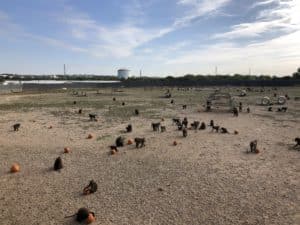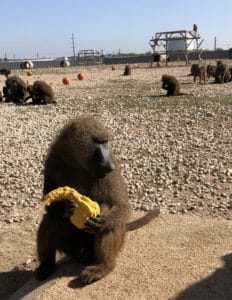Texas Biomed and the Southwest National Primate Research Center highlight daily animal care and enrichment program with special treats donated by the community.
SAN ANTONIO (Nov. 12, 2021) – As COVID-19 vaccinations continue increasing, the Texas Biomedical Research Institute (Texas Biomed) on Friday highlighted how its primate colony in northwestern San Antonio deserves credit for saving lives – locally and around the world.

The Institute’s colony of 2,500 primates received treats of pumpkins donated by local businesses, churches and organizations thankful for the animals’ contributions to research on vaccines and therapeutics. Early in the pandemic, a team of 43 Texas Biomed scientists validated that baboons, rhesus macaques and marmosets showed similar progression of SARS-CoV-2 infection to that of humans, meaning they could be used in preclinical animal research investigating vaccine candidates and therapeutics.

Rhesus macaques at the Southwest National Primate Research Center (SNPRC) at Texas Biomed played critical roles in the development of the Pfizer-BioNTech COVID-19 vaccine and Regeneron’s monoclonal antibody therapeutic. Texas Biomed has continued its COVID-19 work with more than 30 active research projects and the Pfizer-BioNTech vaccine has been given to over 250 million people around the world.
“Research with animals continues to be critical for the advancement of human health, said Deepak Kaushal, PhD, director of the SNPRC at Texas Biomed. “Disease processes are complex, involving multiple physiological processes and multiple animal systems that require the use of primates. Rhesus macaques share 93% of human DNA, so there is extensive genomic similarity between the two. Rhesus are also susceptible to infection with human pathogens, so they are excellent models for the study of infectious diseases.”
Animal research, used in essentially every major advance in medical knowledge and treatment, has saved lives, extended life expectancy, and improved the quality of life for both humans and animals. Examples of Texas Biomed research successes not related to COVID-19 include the development of high-frequency neonatal ventilators, a hepatitis B vaccine and new hepatitis C virus treatments.
Friday’s “Pumpkins and Primates” event on the Institute’s 200-acre campus also focused on SNPRC’s scientifically-backed enrichment, nutrition and care programs. A team of highly trained veterinarians and veterinary care/behavior staff is responsible for the welfare of the animals, which is also overseen by the federal government and by an institutional animal care and use committee.

The primate enrichment program aims to stimulate species-typical behaviors and promote the physical and psychological health of our primates using social, physical, occupational, feeding and sensory enrichment. Environmental enrichment is designed to elicit the same behaviors as would be seen in the wild, like foraging and social behaviors. Group housing is used to elicit social behaviors, which is particularly critical for developing infants. Physical enrichment includes items such as swings, climbing structures and high perches. Occupational enrichment entails devices that can stimulate problem-solving behavior, motor skills and investigative behaviors. The SNPRC provides a stable, nutritionally complete diet and additional fruits, grains and vegetables (including pumpkins!) to the animals.
###
About the Southwest National Primate Research Center at Texas Biomed
Texas Biomed is one of the world’s leading independent biomedical research institutions dedicated to advancing health worldwide through innovative biomedical research focused on protecting the global community from the threats of infectious diseases. The Institute is home to the Southwest National Primate Research Center (SNPRC) and provides broad services in primate research. SNPRC contributes to a national network of National Primate Research Centers (NPRCs) with specialized technologies, capabilities and primate resources, many of which are unique to the SNPRC. The Center also serves investigators around the globe with research and technical procedures for collaborative projects. For more information on Texas Biomed, go to www.TxBiomed.org or for more information on SNPRC, visit www.SNPRC.org.